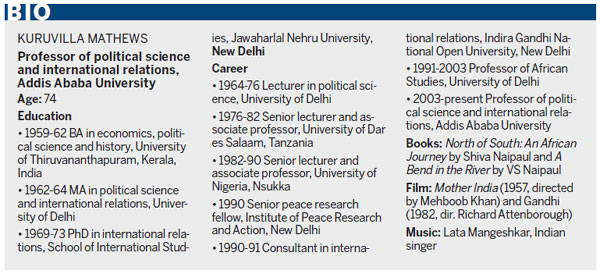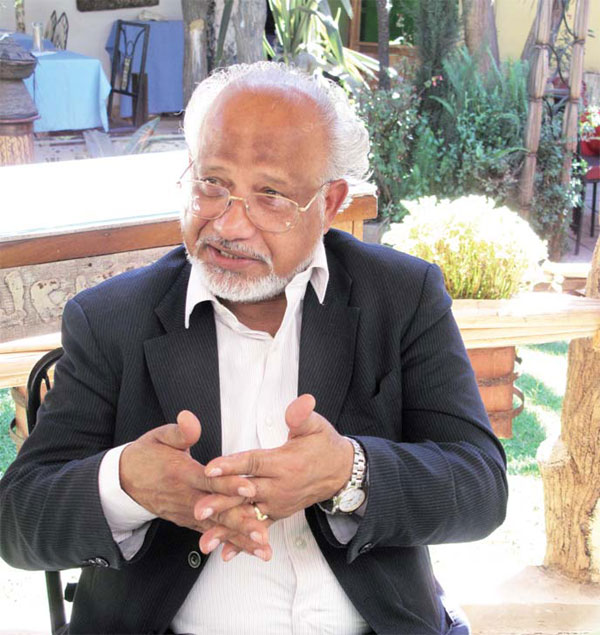China filled West's void in Africa
Updated: 2014-04-20 08:00
By Andrew Moody and Wang Chao (China Daily)
|
|||||||||||
West abandoned Africa, then realized the void had been filled, noted academic says
Kuruvilla Mathews said the West has been caught off guard by China's new engagement in Africa.
The distinguished Indian academic, who has met legendary African figures as diverse as Muammar Gaddafi, Robert Mugabe and Nelson Mandela in a 50-year career, believes the West never saw it coming.
"They practically withdrew from Africa in the 1980s and 1990s. They started thinking of Africa as a basket case that could produce nothing but poverty, famine or dictators," he said of the Western powers.
The professor of political science and international relations at Addis Ababa University was speaking over lunch amid the lush tropical plants of the city's famous Lucy restaurant next to the National Museum of Ethiopia.
As a result the West is now crying wolf about China emerging as the continent's largest trading partner by accusing it of being a neo-colonial power, he said.
"I am not denying that China has a national interest. The promotion of a country's national interest has to be the first priority. Everything else is secondary.
"It realizes that Africa is an important source of resource, and these are vital for its own national economic development. This is becoming even more the case with countries such as Kenya, Uganda, Ghana and also now Ethiopia discovering oil. All the historical evidence suggests, however, that China has not been interested in colonizing anywhere."
Mathews, a kindly and engaging raconteur known to his friends as "Kay", believes Chinese rhetoric of a "win-win" engagement and gestures such as the gift to the African people of a $200 million African Union headquarters do, however, signify foreign policy intent.
"They need good relations with Africa. They are trying to create a support base for China on the continent. I think what people don't realize is that they have a very long-term perspective, perhaps thinking a century ahead, which the Western powers are not.
"It is very important for China to get diplomatic support in the United Nations. Even though China has a veto on the Security Council ,that bloc of 54 Africa votes in the General Assembly is vital."
Mathews, who is from Kerala in southern India, has had a long career as an academic in Africa, working across the disciplines of political science, international relations and African studies.
He studied originally in his home country, leading to a doctorate at the School of International Studies at Jawaharlal Nehru University in New Delhi in the 1960s.
After lecturing for more than a decade at Delhi University, he went to Africa in his mid-30s to teach at the University of Dar-es Salaam.
"Although there are many Indians in east Africa who have been there for centuries I had no family links with Africa before I went there," he said.
After Tanzania, he took up an associate professorship at the University of Nigeria in Nsukka, where he spent a decade in a country undergoing political turmoil.
By way of Oxford University, where he spent a year as a visiting research fellow at Queen Elizabeth House, the school's development studies center, he had a brief spell back in India, before returning to Africa again, taking up his current role at Addis Ababa in 2003.
The last decade has proved a more optimistic one for the continent with much greater involvement from Asian countries such as China and a weaker hold by former colonial powers such as the UK and France.
Mathews said some of this still has its roots in the Bandung Conference in Indonesia in 1955, which aimed to promote economic and cultural cooperation between Asia and Africa and also to oppose colonialism.
"We have now moved into a new phase and stepped up a gear. China realizes that Africa is an important source of minerals and other resources, so if it can get a foothold in Africa, taking more interest in African issues serves its interest too," he said.
The Africanist believes the West has only itself to blame with the IMF and the World Bank trying to force "structural adjustment" and encouraging private-sector development in Africa in the 1980s and 1990s - now referred to as the Washington Consensus.
"Structural adjustment was the main theme of the Western approach to development in Africa, and it was a disaster. It didn't help Africa at all, and the end result was more deprivation and poverty. That is why China is seen as something completely new."
Mathews said it could be seen as surprising that of the major Asian nations it is China that has managed to build a stronger position in Africa, despite India's having all the advantages.
"India is culturally much closer in music, dance, food and even in religious terms, but because of various systemic problems, India is not able to take advantage of these historic advantages.
"India is a well-established democracy that moves very slowly. China can do things fast - quickly and more effectively. They get things done. If someone wants to construct a highway, China will say it can do it in two years but deliver in half the time. In India there is so much corruption they can't deliver anything on time."
Mathews, who has made two recent visits to China, including one as visiting professor at East China Normal University in Shanghai, does not go along with the Martin Jacques view in When China Rules the World that we are about to enter a Sinocentric universe.
"I actually bought that book when I was in Beijing. I don't think it is going to be a reality. China might want to influence the world but its culture is difficult to export and it tends to be more absorbing of other cultures."
Contact the writers through andrewmoody@chinadaily.com.cn
|
Greater involvement by China has brought more optimism to Africa, says Kuruvilla Mathews. Wang Chao / China Daily |

(China Daily 04/20/2014 page21)
Today's Top News
Putin makes overture to incoming NATO chief
China on frontlines of cyber threat
China raises alert against cancer
William, Kate visit Australian air force base
Ukraine mulls constitutional reform
APEC fuels interest in English
Anti-graft push gives more family time
Property price surge could soon over
Hot Topics
Lunar probe , China growth forecasts, Emission rules get tougher, China seen through 'colored lens', International board,
Editor's Picks

|

|

|

|

|

|






